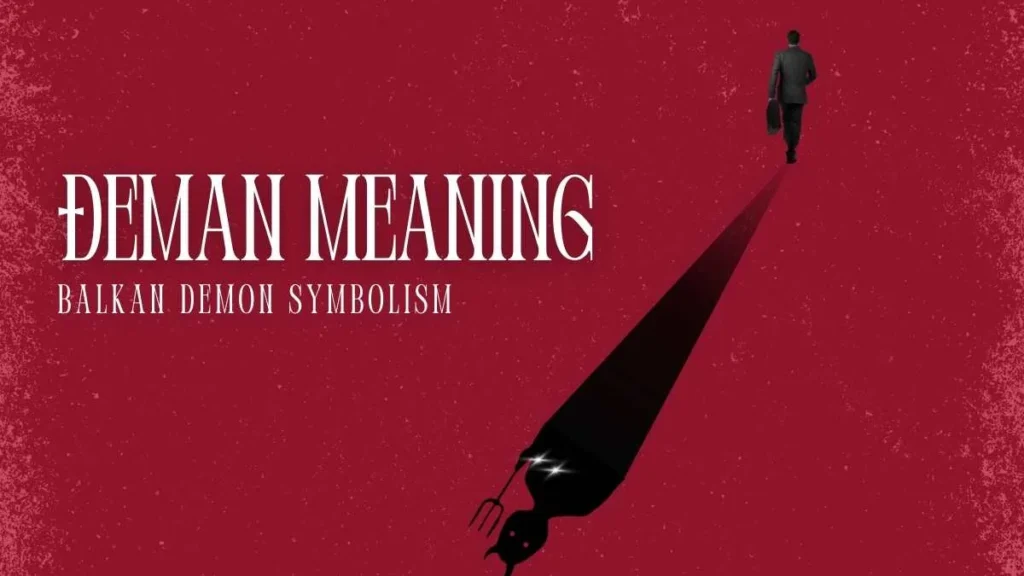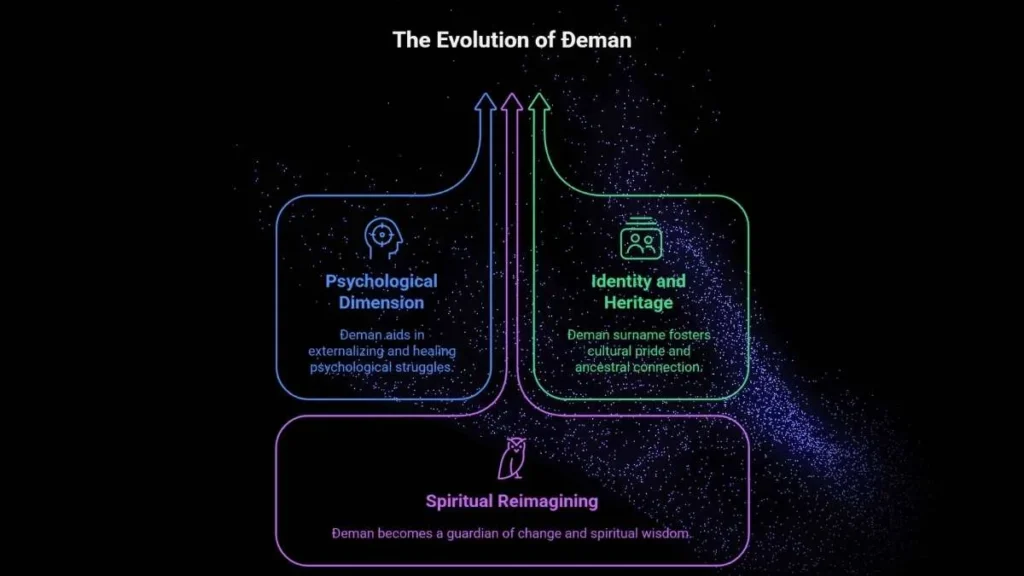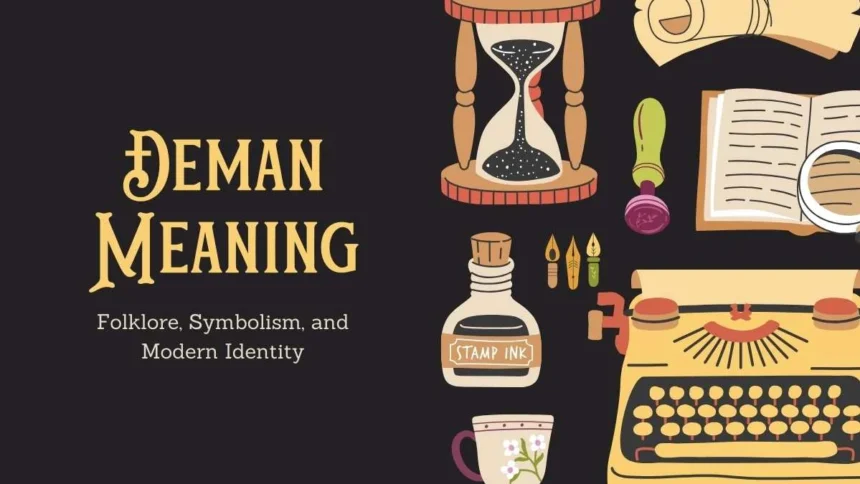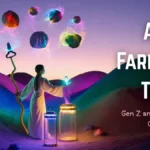Đeman is a term deeply rooted in Slavic, Balkan, and Southeast European traditions. It refers to a supernatural being, often seen as a demon, spirit, or dark entity connected to the unseen world. In folklore, it embodies mystery, fear, and transformation, making it one of the most enduring cultural symbols in regional storytelling.
- Linguistic Origins and Cultural Roots
- Folklore Interpretations of Đeman
- Major Differences in the Traditional and Modern Meanings
- Cultural Symbolism and Inner Meaning
- Đeman in Literature, Art, and Popular Culture
- Modern Interpretations of Đeman
- Global Relevance and Universal Appeal
- From Demon to Metaphor: The Evolution of Đeman
- FAQs
- Conclusion
In modern times, the meaning of Đeman extends beyond folklore. It symbolizes resilience, inner strength, and the balance between light and shadow. Some families carry it as a surname or personal name, giving it an aura of defiance and heritage. Today, it bridges the past and present, serving as a metaphor for overcoming struggles and embracing transformation.
Linguistic Origins and Cultural Roots
The word “Đeman” is believed to stem from regional dialects within Slavic and Balkan languages, with phonetic variations influenced by Ottoman Turkish, Greek, and other Southeast European linguistic layers. In many Slavic tongues, similar words were historically associated with demons, spirits, or supernatural beings that stood outside the human world.
The phoneme “Đ” itself is regionally specific, tied to South Slavic orthography, which already sets the term apart as culturally distinct. Its presence in folk songs, oral storytelling, and regional literature reinforces its association with mystery and the supernatural. Over time, it began to transcend its literal meaning, acquiring metaphorical depth that aligned with changing cultural contexts.
Folklore Interpretations of Đeman
In mythology, it carries different shades of meaning:
- As a feared spirit: Representing unexplained misfortune, illness, or darkness in forests.

- As a test of courage: Folklore heroes often confronted a Đeman, symbolizing resilience and inner growth.
- As a protective force: In some traditions, invoking Đeman could keep evil away, showing its dual nature.
This blend of fear and respect made it both a shadow and a guardian, shaping its role in cultural memory.
Major Differences in the Traditional and Modern Meanings
| Context | Traditional Meaning | Modern Interpretation |
| Folklore | Demon, spirit, supernatural force | Symbol of shadow and resilience |
| Community Belief | Protection, fear, misfortune | Balance between light and darkness |
| Naming Practice | Family safeguard, mythical tie | Strength, uniqueness, cultural identity |
| Personal Growth | Hero’s trial against unseen forces | Metaphor for inner struggles and growth |
Cultural Symbolism and Inner Meaning
The symbolic layers of Đeman go beyond literal demons:
- Inner struggles: Represent personal fears and challenges.
- Shadow forces: Signifies the unseen aspects of life and human nature.
- Resilience: Embodies transformation through hardship.
- Balance: Connects to Jungian psychology, integrating light and dark for wholeness.
This duality ensures its relevance across generations.
Đeman in Literature, Art, and Popular Culture
Over time, Đeman has inspired poets, writers, and artists across Southeast Europe. Its use as a symbol of mystery and inner conflict often emerges in works dealing with existential struggles, moral dilemmas, or the clash between tradition and modernity.
- In literature, Đeman appears as both a literal spirit and a metaphorical challenge, embodying the human condition’s complexity.
- In visual art, representations of Đeman emphasize dark yet captivating imagery, shadows, forests, and faces hidden in mist.
- In popular culture, the term surfaces in modern music, film, and even as character names in fantasy fiction, reflecting its adaptability and resonance with audiences beyond its original cultural roots.
Modern Interpretations of Đeman
Today, it has shifted from fearsome folklore to empowering metaphor.
Psychological Dimension
People use it to describe their “inner demons,” externalizing trauma, anxiety, or hidden struggles. Naming the darkness allows healing and resilience.
Identity and Heritage
Carrying Đeman as a surname strengthens cultural pride and connects individuals to ancestral traditions.
Spiritual Reimagining
Rather than a destructive entity, it can symbolize a guardian of thresholds, helping people transition through change, growth, and wisdom.

Global Relevance and Universal Appeal
Although rooted in Slavic and Balkan traditions, it resonates far beyond Southeast Europe, offering a universal metaphor for resilience and balance. In psychology, it reflects the struggle with inner demons and healing; in literature and art, it fuels stories of transformation; and in cultural dialogue, it reminds societies to embrace both light and darkness. By transcending geography, Đeman demonstrates how a regional folkloric term can evolve into a global symbol with enduring human relevance.
From Demon to Metaphor: The Evolution of Đeman
The journey of Đeman, from folkloric spirit to surname to modern metaphor, demonstrates the adaptability of cultural symbols. What once evoked fear now inspires resilience. What once symbolized danger now represents transformation.
This evolution underscores a key aspect of folklore: its fluidity. Words and symbols never remain fixed; they transform to reflect the needs, fears, and hopes of each generation. It exemplifies this dynamic, reminding us of the interconnectedness between tradition and modernity.
FAQs
Q1: Is Đeman always considered evil in folklore?
No, it is sometimes seen as protective or guiding, depending on tradition.
Q2: Why do some families carry Đeman as a surname?
It symbolizes strength, resilience, and cultural heritage.
Q3: How is Đeman used in modern psychology?
It metaphorically describes personal struggles, often called “inner demons.
Conclusion
Đeman is not just a folkloric word; it is a living cultural symbol. Born in Slavic, Balkan, and Southeast European traditions, it once referred to shadowy spirits and supernatural forces. Over centuries, it evolved into a surname, a personal name, and a metaphor that reflects resilience, transformation, and identity.
In today’s world, it speaks to universal human struggles: embracing both darkness and light, facing fears, and finding strength through adversity. From past to present, Đeman remains a timeless reminder that within every shadow lies the potential for growth and wisdom.






